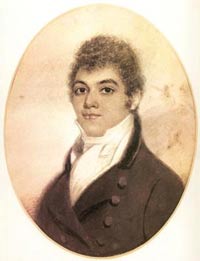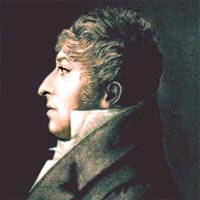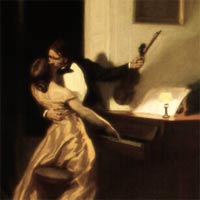The Kreutzer Sonata - Beethoven's Groundbreaking 'Double Concerto'
Explore the Kreutzer Sonata, Beethoven's explosive, genre-defining violin sonata.
Hastily stitched together, the sonata's raw energy and revolutionary techniques have cemented its status as one of music's most popular and famous violin sonatas.
Let's explore the origins of this masterful chamber piece...
History

Over 200 years ago, in 1803, the violinist George Bridgetower went to Vienna.
Half black (his mother was Polish and his father was from the West Indies), Bridgetower had managed to create a reputation as an exotic and talented musician. He was tall and handsome, with a strong posture, and had performed successfully for the King of England.
Beethoven met Bridgetower, and was intrigued. The violinist, it seems, was also a fan of Beethoven's. He asked the master composer to write a violin sonata for Bridgetower's musical debut in Vienna's artistic society.
Beethoven agreed and set to work. He had already made sketches for the first movement and finale, but not used them. He resurrected these powerful ideas and turned them into the sonata's first movement.
In an early concert (it started at 8 in the morning!), the new duo performed Beethoven's new composition. Typically for Beethoven, he had only just managed to finish it in time and hand over the score to the violinist!
Bridgetower had to perform the second movement from sight by reading Beethoven's spidery ink manuscript, with no previous rehearsal. Beethoven improvised a lot of the sonata as well.
It must have been a fascinating performance. Of course, all we have now are first hand accounts.
Bridgetower recalled that Beethoven played a big scale on the piano, which Bridgetower then imitated on a whim. Beethoven stopped, leapt up and hugged Bridgetower for his innovation, then resumed playing.
Astoundingly the premiere was a smashing success. At the "after-party", Beethoven publicly announced the piece's dedication: "Sonata per uno mulaticco lunattico" (Sonata for a crazy mulatto).
Hang on... why is the piece called the Kreutzer Sonata?

Good question! Legend tells that composer and violinist were having a drink later on, and Bridgetower accidently made a rude joke about a woman Beethoven was fond of.
Beethoven flared up in a rage and changed the dedication of the sonata to Rodolphe Kreutzer, one of the greatest violinists of the age.
Ironically, when Kreutzer heard about this and read the sonata's score, he complained! He said that Beethoven had no clue about the violin, and the piece was impossible to play.
Kreutzer never even once played the sonata that bears his name.
George Bridgetower died poor and lonely in London, his name forgotten.
Music

The Kreutzer Sonata is famous because it's so ground-breaking. Beethoven created a piece that stretched the entire violin sonata genre, and signaled a change in the composer's own style of writing music.
Beethoven wasn't just a talented, modernistic composer anymore - he was a budding giant of music, bringing the noble art crashing into new dimensions of expression and innovation.
The Kreutzer has wide ranging emotions and a powerful weight behind it. It's almost like a double concerto for the two instruments, blending complexity and steep technical challenges with grand drama and climactic fury.
The time Beethoven's life is an important element in the Kreutzer's innovation. The composer had just recently come to terms with his worsening deafness.
He was depressed and unstable, but the Kreutzer Sonata (and more importantly the Eroica Symphony, published the next year) announced that he was determined to continue composing and living for his art.
The Sonata is in three movements...
- Adagio Sostenuto: A furious, dark blast through Beethoven's inner feelings. The most famous of the movements in the sonata.
- Andante: Here we hear a complete change - a calm and reflective set of variations.
- Presto: A virtuosic finale, romping through a new type of emotion: joy.
Beethoven also completely smashed up traditional music theory in his incredible string quartets.
Recommended Recording
I'm only going to look at one recording, for a change. This is the modern (from 1998) live performance by pianist Vladimir Ashkenazy with violinist Itzhak Perlman.
This performance is widely hailed the best interpretation of the Kreautzer Sonata ever recorded. Two musical behemoths at the peak of their ability. Their combined force is more than the sum of its parts - the performance is dramatically transcendental.
True, there might have been some earlier ones with slightly more powerful musicality, but the fact that the recording is recent (i.e. great audio quality) is what makes it the best all-rounder for me. Recommended!
You might also be interested in Beethoven's string quartets, or the composer's masterful violin concerto.
If you like my site, please click "Like"... thanks!


